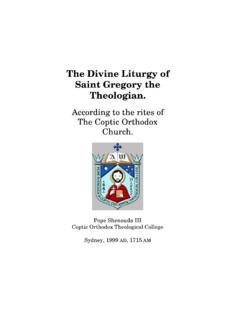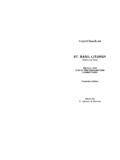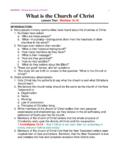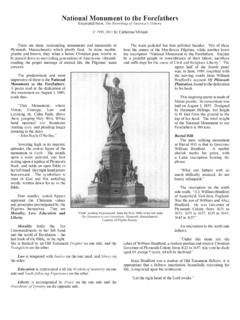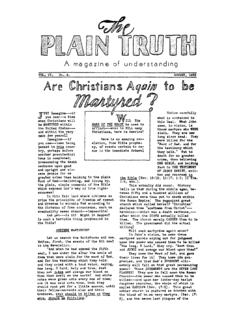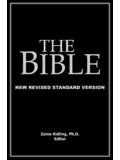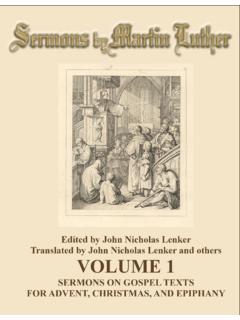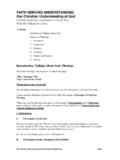Transcription of On the Incarnation - Coptic Orthodox Church Network
1 On the IncarnationDe Incarnatione Verbi DeiBy: St. AthanasiusSt. Mark Coptic Orthodox Church427 West Side Ave, Jersey City, NJ 07304 Available via: January, 1999 Athanasius stood contra mundum ("against theworld") in defense of the biblical doctrine of opposed Arius when it seemed all the worldwould follow Arius's heresy. Athanasius's workremains even today the definitive statement oforthodox Creation and the Falln our former book[1] we dealt fully enoughwith a few of the chief points about theheathen worship of idols, and how those falsefears originally arose. We also, by God's grace,briefly indicated that the Word of the Father isHimself divine, that all things that are owe theirbeing to His will and power, and that it is throughHim that the Father gives order to creation, by Himthat all things are moved, and through Him thatthey receive their being. Now, Macarius, true loverof Christ, we must take a step further in the faith ofour holy religion, and consider also the Word'sbecoming Man and His divine Appearing in ourmidst.
2 That mystery the Jews traduce, the Greeksderide, but we adore; and your own love anddevotion to the Word also will be the greater,because in His Manhood He seems so little it is a fact that the more unbelievers pour scornon Him, so much the more does He make HisGodhead evident. The things which they, as men,rule out as impossible, He plainly shows to bepossible; that which they deride as unfitting, Hisgoodness makes most fit; and things which thesewiseacres laugh at as "human" He by His inherentmight declares divine. Thus by what seems Hisutter poverty and weakness on the cross Heoverturns the pomp and parade of idols, andquietly and hiddenly wins over the mockers andunbelievers to recognize Him as in dealing with these matters it is necessaryfirst to recall what has already been said. You mustunderstand why it is that the Word of the Father,so great and so high, has been made manifest inbodily form.
3 He has not assumed a body as properto His own nature, far from it, for as the Word He iswithout body. He has been manifested in a humanbody for this reason only, out of the love andgoodness of His Father, for the salvation of usmen. We will begin, then, with the creation of theworld and with God its Maker, for the first fact thatyou must grasp is this: the renewal of creation hasbeen wrought by the Self-same Word Who made itin the beginning. There is thus no inconsistencybetween creation and salvation for the One Fatherhas employed the same Agent for both works,effecting the salvation of the world through thesame Word Who made it in the beginning.(2) In regard to the making of the universe andthe creation of all things there have been variousopinions, and each person has propounded thetheory that suited his own taste. For instance,some say that all things are self- originated and, soto speak, haphazard.
4 The Epicureans are amongthese; they deny that there is any Mind behind theuniverse at all. This view is contrary to all the factsof experience, their own existence included. For ifall things had come into being in this automaticfashion, instead of being the outcome of Mind,though they existed, they would all be uniform andwithout distinction. In the universe everythingwould be sun or moon or whatever it was, and inthe human body the whole would be hand or eyeor foot. But in point of fact the sun and the moonand the earth are all different things, and evenwithin the human body there are differentmembers, such as foot and hand and head. Thisdistinctness of things argues not a spontaneousgeneration but a prevenient Cause; and from thatCause we can apprehend God, the Designer andMaker of take the view expressed by Plato, thatgiant among the Greeks. He said that God hadmade all things out of pre-existent and uncreatedmatter, just as the carpenter makes things only outof wood that already exists.
5 But those who holdthis view do not realize that to deny that God isHimself the Cause of matter is to impute limitationto Him, just as it is undoubtedly a limitation on thepart of the carpenter that he can make nothingunless he has the wood. How could God be calledMaker and Artificer if His ability to make dependedon some other cause, namely on matter itself? IfHe only worked up existing matter and did notHimself bring matter into being, He would be notthe Creator but only a , again, there is the theory of the Gnostics,who have invented for themselves an Artificer of allthings other than the Father of our Lord JesusChrist. These simply shut their eyes to the obviousmeaning of Scripture. For instance, the Lord,having reminded the Jews of the statement inGenesis, "He Who created them in the beginningmade them male and female.. ," and havingshown that for that reason a man should leave hisparents and cleave to his wife, goes on to say withreference to the Creator, "What therefore God hasjoined together, let no man put asunder.
6 "[2] Howcan they get a creation independent of the Fatherout of that? And, again, St. John, speaking allinclusively, says, "All things became by Him andwithout Him came nothing into being.[3] How thencould the Artificer be someone different, other thanthe Father of Christ?(3)Such are the notions which men put the impiety of their foolish talk is plainlydeclared by the divine teaching of the Christianfaith. From it we know that, because there is Mindbehind the universe, it did not originate itself;because God is infinite, not finite, it was not madefrom pre-existent matter, but out of nothing and outof non-existence absolute and utter God brought itinto being through the Word. He says as much inGenesis: "In the beginning God created theheavens and the earth;[4] and again through thatmost helpful book The Shepherd, "Believe thoufirst and foremost that there is One God Whocreated and arranged all things and brought themout of non-existence into being.
7 "[5] Paul alsoindicates the same thing when he says, "By faithwe understand that the worlds were framed by theWord of God, so that the things which we see nowdid not come into being out of things which hadpreviously appeared."[6] For God is good or rather,of all goodness He is Fountainhead, and it isimpossible for one who is good to be mean orgrudging about anything. Grudging existence tonone therefore, He made all things out of nothingthrough His own Word, our Lord Jesus Christ andof all these His earthly creatures He reservedespecial mercy for the race of men. Upon them,therefore, upon men who, as animals, wereessentially impermanent, He bestowed a gracewhich other creatures lacked namely the impress ofHis own Image, a share in the reasonable being ofthe very Word Himself, so that, reflecting Him andthemselves becoming reasonable and expressingthe Mind of God even as He does, though inlimited degree they might continue for ever in theblessed and only true life of the saints in since the will of man could turn either way,God secured this grace that He had given bymaking it conditional from the first upon twothings namely, a law and a place.
8 He set them inHis own paradise, and laid upon them a singleprohibition. If they guarded the grace and retainedthe loveliness of their original innocence, then thelife of paradise should be theirs, without sorrow,pain or care, and after it the assurance ofimmortality in heaven. But if they went astray andbecame vile, throwing away their birthright ofbeauty, then they would come under the naturallaw of death and live no longer in paradise, but,dying outside of it, continue in death and incorruption. This is what Holy Scripture tells us,proclaiming the command of God, "Of every treethat is in the garden thou shalt surely eat, but ofthe tree of the knowledge of good and evil ye shallnot eat, but in the day that ye do eat, ye shallsurely die."[7] "Ye shall surely die" not just die only,but remain in the state of death and of corruption.(4) You may be wondering why we arediscussing the origin of men when we set out totalk about the Word's becoming Man.
9 The formersubject is relevant to the latter for this reason: itwas our sorry case that caused the Word to comedown, our transgression that called out His love forus, so that He made haste to help us and toappear among us. It is we who were the cause ofHis taking human form, and for our salvation that inHis great love He was both born and manifested ina human body. For God had made man thus (thatis, as an embodied spirit), and had willed that heshould remain in incorruption. But men, havingturned from the contemplation of God to evil oftheir own devising, had come inevitably under thelaw of death. Instead of remaining in the state inwhich God had created them, they were in processof becoming corrupted entirely, and death hadthem completely under its dominion. For thetransgression of the commandment was makingthem turn back again according to their nature; andas they had at the beginning come into being outof non-existence, so were they now on the way toreturning, through corruption, to non-existenceagain.
10 The presence and love of the Word hadcalled them into being; inevitably, therefore whenthey lost the knowledge of God, they lost existencewith it; for it is God alone Who exists, evil isnon-being, the negation and antithesis of good. Bynature, of course, man is mortal, since he wasmade from nothing; but he bears also the Likenessof Him Who is, and if he preserves that Likenessthrough constant contemplation, then his nature isdeprived of its power and he remains incorrupt. Sois it affirmed in Wisdom: "The keeping of His lawsis the assurance of incorruption."[8] And beingincorrupt, he would be henceforth as God, as HolyScripture says, "I have said, Ye are gods and sonsof the Highest all of you: but ye die as men and fallas one of the princes."[9](5) This, then, was the plight of men. God hadnot only made them out of nothing, but had alsograciously bestowed on them His own life by thegrace of the Word.

